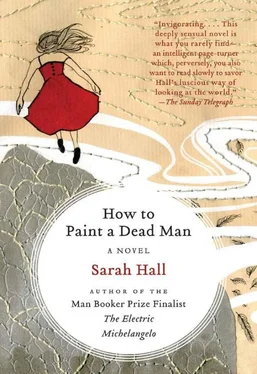Sarah Hall - How to Paint a Dead Man
Здесь есть возможность читать онлайн «Sarah Hall - How to Paint a Dead Man» весь текст электронной книги совершенно бесплатно (целиком полную версию без сокращений). В некоторых случаях можно слушать аудио, скачать через торрент в формате fb2 и присутствует краткое содержание. Год выпуска: 2009, Издательство: Harper Perennial, Жанр: Современная проза, на английском языке. Описание произведения, (предисловие) а так же отзывы посетителей доступны на портале библиотеки ЛибКат.
- Название:How to Paint a Dead Man
- Автор:
- Издательство:Harper Perennial
- Жанр:
- Год:2009
- ISBN:нет данных
- Рейтинг книги:4 / 5. Голосов: 1
-
Избранное:Добавить в избранное
- Отзывы:
-
Ваша оценка:
- 80
- 1
- 2
- 3
- 4
- 5
How to Paint a Dead Man: краткое содержание, описание и аннотация
Предлагаем к чтению аннотацию, описание, краткое содержание или предисловие (зависит от того, что написал сам автор книги «How to Paint a Dead Man»). Если вы не нашли необходимую информацию о книге — напишите в комментариях, мы постараемся отыскать её.
, Sarah Hall, "one of the most significant and exciting of Britain's young novelists" (
), delivers "a maddeningly enticing read... an amazing feat of literary engineering" (
).
How to Paint a Dead Man — читать онлайн бесплатно полную книгу (весь текст) целиком
Ниже представлен текст книги, разбитый по страницам. Система сохранения места последней прочитанной страницы, позволяет с удобством читать онлайн бесплатно книгу «How to Paint a Dead Man», без необходимости каждый раз заново искать на чём Вы остановились. Поставьте закладку, и сможете в любой момент перейти на страницу, на которой закончили чтение.
Интервал:
Закладка:
It was going through Danny’s things in his flat in town that finally broke you. It was doing the job that people always say is the most difficult duty of bereavement. It was smelling him on his clothing, his signature odour: sweat, Obsession and pheromones. It was seeing his last cup of tea with its thick mouldering meniscus sitting next to the sink, half drunk — evidence of a man once thirsty, once living. It was dismantling the proof of Danny that hurt the most, pouring out the tea, washing the cup, packing his stuff up. You had, via the clearing of daily instruments and ordinary items, like his keys and his harmonica, his badly rinsed contact lenses and his strange vintage medical kit with its lint and gammy tube of silver cream, decreed that all the accoutrements of his existence were now meaningless, redundant. Not knowing his location, not knowing where to look, or how to find him, even though proof of his being lay all around, even though it seemed at any moment he might stumble home and be, as he always was, so pleased to see you: this is what put you face down on the floor, crying until you retched, crying until the corners of your mouth tore and bled, holding his old red trainers to your chest, and calling for him and calling for him. Some kind, internal mechanism saved you, provided anaesthetic. A switch flicked, your eyes closed, and your head went dark.
Personal effects: how irrelevant they are, how sad, how lost, how vagrant, without the force that gives them purpose.
He didn’t have much in the flat of course. He wasn’t one for hoarding junk, not domestically anyway. There was no extensive CD collection, no Dungeons & Dragons figures in their original boxes, no cufflinks belted down in their cases by elastic loops. His money went on other things: beer, dope, a pouch of Kendal Twist every week — like father, like son — buses to London, copper flex, a blacksmith course, and any piece of architectural salvage that spoke to him, demanding rescue. Chimney pots, stained glass, iron. Leaning against the walls of his yard were old gateposts and banisters, weather vanes and barbers’ poles. Stacked in neat piles under the washing line were painted Victorian tiles, enamelled cabinets and zinc watering cans.
The wheel of a gypsy caravan.
A brass pump-hose.
Danny the barrow-man. Danny the champion of bespoke and bygone things.
As you stood in the crowded yard you thought about that sixth-form trip to the V&A, when you and he had walked along the corridor of metalwork, under wrought black roses and ornate tulip brackets. Suddenly your dopey brother had woken up to the possibilities of art and craft. Look, Suze. Look, it’s so beautiful. How do they do that? his pond-brown eyes wide open, pushing his dark carpet fringe to one side. He had sat down right there and written something in his dog-eared, doodled-over notebook, his legs sprawling out, getting in the way of tourists. Danny with his pubescent masculinity, who had only just grown into his chest and his height, whom the girls at school had only just begun to notice.
He’d stood up, put his hands either side of a great Meccano angel, and pushed gently. You don’t know why. Maybe because he always had to put his hands on things. The sculpture rocked back and the tip of one wing hit the arbour at its side. It clanged like a dropped bell. Booooooong. The muse had spoken. The look on his face. Stupefaction. Pure joy. Cue the guards, and the pair of you were chucked out of the museum, to the mortification of your teacher, who thought better of you at least, Susan. A typically Caldicutt disgrace of course. Your dad thought it was brilliant when you told him, one for the proles, and he kept the letter the school sent home, sticking it up on the studio wall.
Danny had a little yellow book— Wrought Ironwork: A Manual of Instruction for Craftsmen -that he carried everywhere he went. He would quote bits of it like philosophy, in situations where he considered it pertinent. Metal worked on the anvil has grace which belies its strength, he’d say on someone’s birthday, as if providing the answer to the universe. You found it on his living-room shelf next to the bong. You kept it-it was one of the only things you did keep. The rest — the bedcover smelling of incense, the farmboy overalls, the rusty saucepan and wok-you boxed up for Oxfam. Danny’s old boss at the scrappy had agreed to empty the yard. He’d offered you money but you said no.
Both Danny’s girlfriends had called round while you were packing things away, within fifteen minutes of each other, as if they’d coordinated their movements, and they probably had. Heather and Terry. Terry and Heather. At the funeral they had stood together, holding hands, giving each other tissues.
When she arrived at the flat, Terry had a piece of paper with her, on which Danny had constructed a ridiculous pissed-up last will and testament. He’d done it one night when they’d gone dam-diving at Thirlmere, she said. She thought it should be handed over, given to a solicitor, to see if it was valid. It was sealed, folded in half, and cruttered. She didn’t know what was in it, she said she hadn’t looked; she wasn’t that sort of person. You told her it probably wouldn’t be applicable if it wasn’t officially notarised, but you thanked her anyway.
You’d met her once before at the flat, her composure soft-soaked on Danny’s couch, smoke curling from the sides of her mouth as she let go of the pipe. She was pretty, wide-eyed, blonde. Wow, you two look dead similar, she’d said. It’s a bit spooky. Then she’d giggled. I’ve never been with a woman. Now she was looking at you soberly through strands of corn-yellow fringe, and again must have been seeing a lot of him in you. Your facial slopes and tones were always just about the same, give or take his square chin, your refined brows. You both wore a red blush just above your jaw-line in cold weather. You still do.
Terry wondered if she could take one of his photographs of the two of them together, to remember him by. She knew where there was one tucked in a dresser drawer, and it was a bit rude anyway. You didn’t tell her you’d already found it, under the ragged chaos of his T-shirts, that you’d seen the two of them, naked, in front of a Lakeland river, a place you recognised because you had swum there every summer of childhood with him. It was a place where the golden mouths of fish blew upwards in the brackish water while you sprawled on your stomachs on the bank and flicked them bread. The reeds grew long beards in the shallows, and you and he would wade through them in your plastic sandals. When you came out your legs would be covered in tiny green worms. You used to pick them off each other, as slowly as you could, seeing who could stand to wear the tickling creatures longest. It was in this place, aged eleven, you’d discovered how you were different, putting a hand there carefully, and describing what you felt. Like a Chinese finger trap. Like gone-down balloons.
In the photograph they were wet-skinned after swimming and pink-shouldered from the sun, her with extraordinary chestnut nipples, his genitals like catkins. You’d put it back in the bureau face down, embarrassed, disarmed by its erotic quality. You’d wondered who had taken it, or whether it had been timed.
As Terry was leaving, she’d hugged you and said that Danny had gotten her off junk, and away from a man who used to clobber her senseless in Harraby. She said he was a darling to her; he made her think about being OK and being free. And as far as she knew he was always a darling to Heather too.
That was the thing. Danny never went in for monogamy. He never chose. I can’t do conventional, he used to say. They’re all so nice. And I’m way too weak with the booze in me. He told them all very early on that his love was a shared commodity, and went with the ones who didn’t mind. The liberals, the hippies, the partygoers, and those girls for whom casual consensual sex was a step up in a relationship. There was something about it you took comfort in: his refusal to prioritise, his being un-winnable. Sometimes you felt guilty, for the connection between the two of you, for having had an unfair advantage all those years-as if, after you, none of them could stack up. True enough, they were all variably inferior. You knew it when he said things like, She’s a babe but she’s just not on my wavelength, Suze. She doesn’t totally get what’s in my head.
Читать дальшеИнтервал:
Закладка:
Похожие книги на «How to Paint a Dead Man»
Представляем Вашему вниманию похожие книги на «How to Paint a Dead Man» списком для выбора. Мы отобрали схожую по названию и смыслу литературу в надежде предоставить читателям больше вариантов отыскать новые, интересные, ещё непрочитанные произведения.
Обсуждение, отзывы о книге «How to Paint a Dead Man» и просто собственные мнения читателей. Оставьте ваши комментарии, напишите, что Вы думаете о произведении, его смысле или главных героях. Укажите что конкретно понравилось, а что нет, и почему Вы так считаете.












